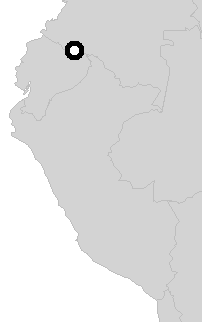
| www.CuriousTaxonomy.net |
|
The Flood in World Myth and Folklore
Andes |
| © 2021 Mark Isaak |

Ñañë and two women he knew went to the house of Thunder, Mujuë. Ñañë had sores and was very ugly. The elder of the two women married Mujuë, who looked nicer. Ñañë bathed and slept in the hammock with the younger sister.
Mujuë prepared to hunt monkeys. Ñañë thought, "I hope he gives me the opportunity to hunt, too," and Mujuë told him to go hunting with a blowpipe. Ñañë thought, "I hope he sends that woman," the one he had slept with. Mujuë told the woman to go with him.
A ways out, Ñañë found a tree and placed all his sores on it. Then he returned, resplendant, to hunt with the woman. They came to a tree. As there were no monkeys, he said, "They can turn to monkeys here," and there were plenty of monkeys. He killed four monkeys, gave two to the woman and kept two, and they returned to the house. Along the way, he gathered the sores and put them on, coming to the house of Thunder like a beggar.
Mujuë prepared a weapon to kill Ñañë; he tested it, and it was good and sharp. Ñañë thought, "he can leave it." Mujuë set the weapon down and went to do something else, and Ñañë switched weapons. Mujuë and Ñañë both made small fires, and they prepared to fight. The sisters wanted to put achiote on Ñañë's nephews, the star-people. They came to the older sister, repudiating the younger for not recognizing Ñañë.
Ñañë was bound and hung on a trunk, and Mujuë tried to cut him, but with no effect; the blade just bounced. Then Mujuë hung on the trunk, and Ñañë cut him into two parts. The upper part became thunder for the summer (August-March), and the lower part became thunder for the rainy season.
Thunder's wife, Rutayo, broke up the pots of chicha and remained crying in the puddle. Ñañë said, "You can live in the earth. When people take yajé [Banisteriopsis sp.], they will see you in visions." Then he kicked her in the back and sent her into the ground.
And then, land remained only where Ñañë was. The other girl, who had run behind Ñañë, he turned into a comb and put in his hair. Looking out, he saw water, only water, in all directions. He imagined, "an animal rises to the surface. A tiny armadillo rose, and he brought it to him. He made the armadillo submerge and return with mud, and with the mud he built a small patch of land anew. He stepped from the water onto the land, and it spread. Thus he created the whole world again.
But the land was entirely bare. A whirlwind came, and God thought, "A person should appear," and the devil, Wati, appeared in the midst of the wind. God forced him to shout, "wiwati", and the second time the devil shouted it, thorny plants appeared. "These are not worthy of man," God thought, and he burned them and made trees. But those were too hard, so he burned them and made new trees, so now there are large and small trees, and man can live easily. And he created people and all animals.
María Susana Cipolletti, Aipe Koka: La Palabra de los Antiguos. Tradición oral Siona-Secoya (Quito: Ediciones ABYA-YALA, MLAL, 1988), 54-60.
